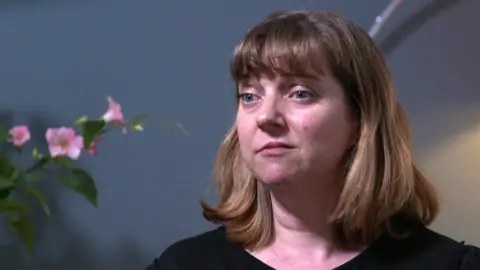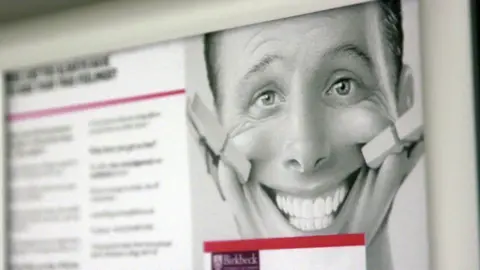How can universities get men to talk about mental health?
 BBC
BBCFar fewer male students than female ones have accessed university counselling and wellbeing services this year, figures suggest.
Despite 44% of students in the UK being male, responses from 100 universities to a Freedom of Information request by BBC Two's Victoria Derbyshire programme suggest only 31% of those using the services were male.
By the time Fraser Lister accessed services at his university he was on course to trying to take his own life.
Two weeks before his GCSE exams, Fraser, aged 16, lost his father who died of heart complications while out running.
Fraser found him in the middle of the road.
"It sent me into a downward spiral," he explains. "But I was determined to get myself to university."
As he began student life, however, new pressures unfolded - both the need to succeed academically and to build new friendships.
He joined the rugby club, but says, "I was dealing with the hyper-masculine sense that I needed to be going out all the time, I needed to be the life and soul of the party."
He was aware university counselling services existed, but never fully engaged with them until finding himself at the point of crisis, when he tried to take his own life.

When Birkbeck, University of London, became the first institution in the UK to assess why this is happening, it says it found worrying results.
While many reported they were struggling with their mental health, they said they felt unable to take the first step in asking for help. Others believed their problems were not serious enough to warrant support.
So the university decided to act.
"They wanted images of masculinity to be challenged," explains Jo Myddleton, one of the university's counsellors.
"They wanted male role models - men who could talk about mental health and be visible in the university."
The outreach team decided to introduce a range of measures to help give men the confidence to come forward - liaising with students at every stage.
A targeted poster campaign was launched, with images of men challenging traditional mindsets.
In one, a man looking strong and running cast a shadow in which he looked fearful. Another showed a man being forced to put on a brave face, with pegs attached to his mouth to ensure he smiled.

Work was also done to demystify the university's counselling service, by creating a video that showed an example session at every stage, featuring one of its professionals.
"We created podcasts too," Ms Myddleton explains, "[in which] four out of the six case studies are male."
Different therapy options are also being looked into, to allow for group therapy sessions and the option of seeking help anonymously online - something some students said would make them more willing to attend counselling.
'Active member of university'
Official figures show there were 95 recorded university student suicides in the 12 months to July 2017 in England and Wales, and that more than twice as many male as female students took their own life.
After Fraser attempted suicide, his mother intervened and told him to seek professional support.
His friends at university marched him down to the counselling service, to ensure he got the help he needed.
Fraser says it made a real difference.
"I gradually started to open up and engage properly," he explains, having built up a level of trust with his counsellor.
"I became a much more active member of not only my [university] but also my academic community.
"I also realised how many people around me were dealing with the same things. In particular, how men were more likely to downplay their emotions in the same way I had."
 Getty Images
Getty ImagesIt is hoped access to such services will continue to improve in future.
The umbrella organisation for university wellbeing, Heads of University Counselling Services, recognises it is an issue.
Alan Percy, its former chairman and currently an executive committee member, told the BBC its strategies "just don't seem to be working".
He said: "Often these men wait until they're in a crisis state before we even know they have a problem.
"[But] it's not just the universities failing men with their mental health, society is failing them too."
'Blueprint for others'
At Birkbeck, there has been a steady rise in uptake among men of 6%, the outreach team says.
It is pleased with the improvement, but knows there is still work to be done.
Over time, though, it hopes to build a blueprint other universities and health services can follow.
"One of our aims was that services across the UK can apply [our model] to their own service, and hopefully allow more men to access help in a timely manner."

